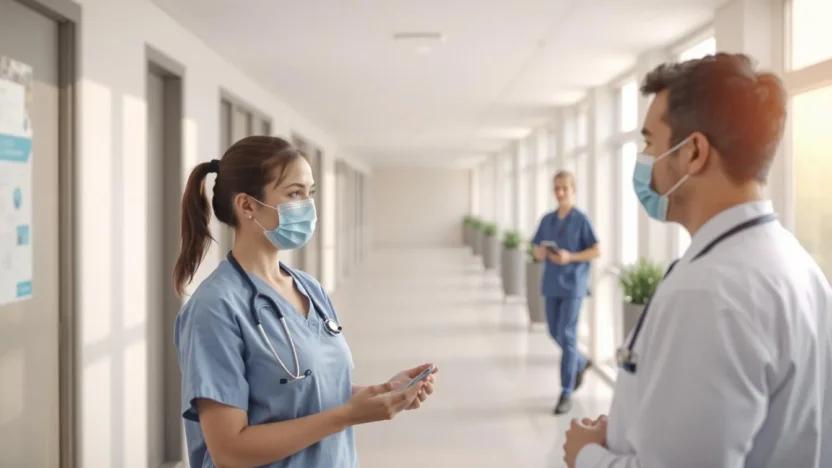Exploring the role of nurses in public health is essential for understanding how these professionals strengthen community well-being and enhance population-level health outcomes. Public health nurses operate on the front lines of community care, working not only to treat illness but also to prevent it. They focus on health promotion, disease prevention, and improving access to essential services—especially for vulnerable and underserved populations. The World Health Organization (WHO) emphasizes that nurses, as the health professionals closest to the public, are crucial in promoting health, preventing disease, and supporting treatment and ongoing care. Although much of their contribution happens behind the scenes, their impact on community health is profound and far-reaching.
Exploring the Role of Nurses in Public Health: Health Education and Disease Prevention
A core responsibility of public health nurses is community health education. They teach individuals and families about wellness, nutrition, disease management, mental health, and preventive practices. Whether through school programs, local workshops, health fairs, or one-on-one counseling, nurses help people understand how lifestyle choices influence long-term health. Because nurses are widely trusted, community members often turn to them first for guidance and clarity about health concerns.
Public health nurses also lead preventive care initiatives. They administer immunizations, organize vaccination clinics, and conduct screenings for conditions such as hypertension, diabetes, or cancer. According to the Centers for Disease Control and Prevention (CDC), these activities are vital in reducing the spread of infectious disease and ensuring early detection of chronic conditions. Beyond providing vaccines and tests, nurses explain their importance in culturally appropriate ways—helping communities overcome myths, fears, or misinformation. By improving health literacy and empowering people to make informed decisions, nurses play a pivotal role in reducing the overall burden of disease.
Exploring the Role of Nurses in Public Health: Community Outreach and Improving Access to Care
Another vital function of public health nurses is improving access to care. Many individuals face barriers to healthcare—such as financial constraints, lack of transportation, limited insurance, or mistrust of medical institutions. Public health nurses help bridge these gaps by bringing services directly into the community. They may provide home visits, run mobile clinics, hold office hours in schools or community centers, or collaborate with local health departments.
During outreach, public health nurses assess not only medical needs but also social determinants of health—factors like food insecurity, unsafe housing, or lack of social support. As noted by the National Academies, nurses often screen for social needs, design care plans, refer individuals to community resources, and work alongside social workers, case managers, and community health workers. By connecting people to nutrition programs, housing assistance, transportation services, or mental health support, nurses help remove obstacles that prevent families from staying healthy. Their outreach efforts ensure that care is equitable and reaches those who might otherwise remain unseen.
Exploring the Role of Nurses in Public Health: Advocacy and Policy Leadership
Public health nurses also play a significant role in shaping health policies and advocating for systemic change. With their firsthand understanding of community challenges—from environmental risks to gaps in service availability—nurses bring valuable insight to policy development. The American Public Health Association defines public health nursing as the practice of promoting and protecting the health of populations through knowledge drawn from nursing, public health, and social sciences. This broad perspective enables nurses to identify emerging health issues, evaluate community needs, and collaborate with local or regional organizations to create solutions.
Many public health nurses participate in advisory boards, support emergency preparedness planning, contribute to public health research, or work with nonprofits to advocate for stronger health programs. Professional organizations such as the American Nurses Association (ANA) further amplify their voice, allowing nurses to influence legislation, improve health equity, and address national challenges such as the opioid epidemic or rising chronic disease rates. According to research supported by the National Institutes of Health (NIH), empowering nurses to work at the full scope of their training is essential for improving population health and advancing health equity.
Conclusion
Exploring the role of nurses in public health reveals how essential they are in building healthier, more resilient communities. Public health nurses educate the public, deliver preventive services, extend care to underserved populations, and advocate for policies that support long-term health. Their mission extends far beyond clinical settings, reaching into neighborhoods, schools, workplaces, and homes.
As new challenges emerge—from pandemics to widening health disparities—the role of public health nurses continues to expand. Supporting these professionals with adequate resources, training, and policy backing is critical to strengthening community health systems. Ultimately, public health nurses are indispensable partners in creating a healthier, more equitable future for everyone.



